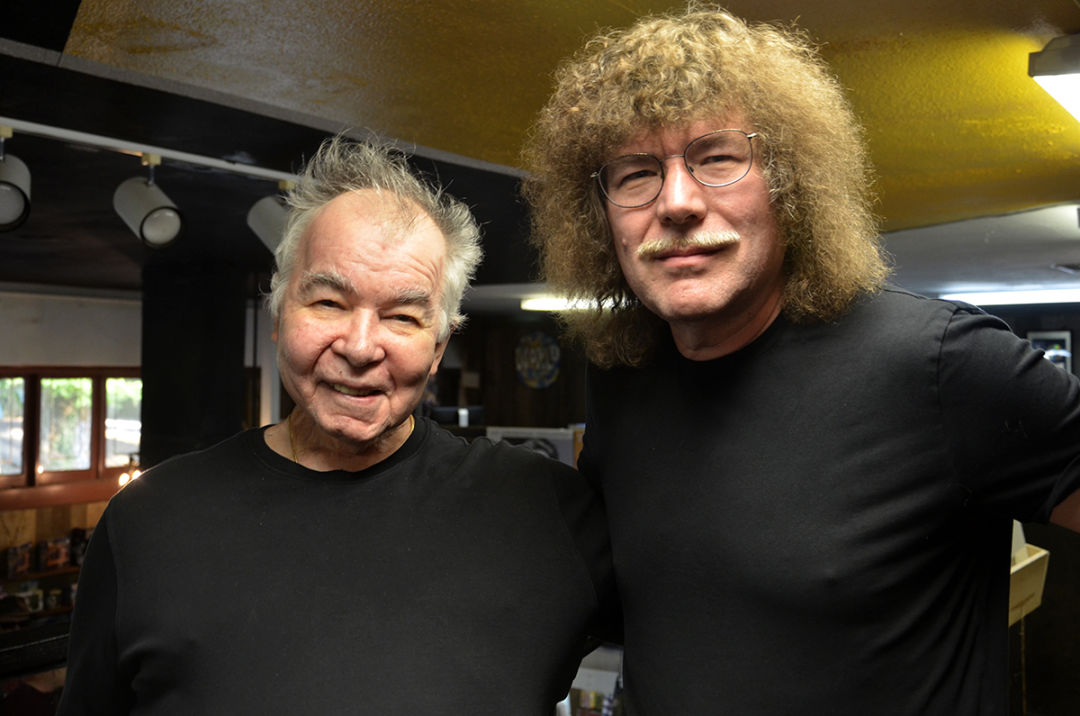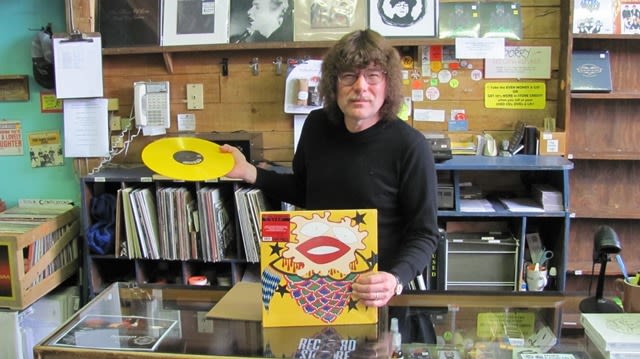Local Record Store Icon Terry Currier Reflects on Music Millennium Turning 50

Terry Currier (right) with singer-songwriter John Prine.
Image: Courtesy Terry Currier
Yes, Terry Currier has his own special day. In 2017, Mayor Ted Wheeler declared August 12 to be "Terry Currier Day," honoring the local record store owner for, well, a ton of shit.
The frizzy-haired icon is, after all, a bona fide local legend. Wheeeler's proclamation lauded his "tireless, unrivaled support and assistance to all facets of the renowned and well-established Portland music community, including musicians, venues and events…." He's an inductee of the Oregon Music Hall of Fame and beloved patron of the local music community. His decades-long battle with Garth Brooks is now Tolkienesque in breadth and lore.
But his most lasting legacy is his beloved record store, Music Millennium, often cited as the oldest continually-existing store in this part of the country. Currier took over Music Millennium on East Burnside in 1996, after joining the store as a manager in 1984. It was always a hard job, he'll tell you. Then, just as now, corporate and cultural forces were amassing to take down the independent music stores. But Currier, if nothing else, is a fighter.
Today, against all odds, Music Millennium turns 50 years old. We chatted with Currier about how far the little store has come—and where it could still go.
Do you worry about the state of the record store?
Oh yeah, it's still definitely a worrisome thing. In 1995, independent record stores started going away because big box retailers were coming into their marketplaces and using music as a loss leader. We had a Best Buy at the time in town, and in a lot of markets they were having big price wars—selling music for several dollars under cost in order to get people to come into their stores. They figured that they could sell them other goods: stereo gear, computers, whatever it might be.
So I started this group called the Coalition of Independent Music Stores. Even though it wasn't affecting me at the time, I could see [that] if independent record stores kept going away across the United States there was going to be a problem in the industry. We needed to have a voice and a support group. Because of that group, we've been able to share ideas with other record stores and other marketplaces during changes in the industry—like when Napster came along. All the stories in this group are in different marketplaces, so nobody feels threatened to share ideas. That group has helped us weather some of those storms.

There were 7,500 record stores [nationwide] in 2000 and there were 1,800 left in 2007. It was going down and there were times I even walked in front of the store and went, "Well, what happens if record stores do go away? What do I do with this building?" I even had thoughts in my head that, well, this could still be Music Millennium but it could be a brewpub with a music motif. People could gather here to talk about the days when there were record stores. [Laughs]
But two other coalitions formed [after ours] and in 2007, at the low point of record stores, the three coalitions got together and started Record Store Day. We used that day to try to ask the industry to get compelling content on vinyl—a format that nobody cared about in the industry at that time. That first year we were able to get 50 titles. We actually hired a person to do national press and everything. We used it as a forum to get the word out that there are still 1,800 records stores out here. Because the media had really painted a picture that record stores were either on their way out or already gone.
How has the industry changed for the better since then?
New vinyl [in 2007] was probably under a quarter of 1 percent [of sales]. Now vinyl could be as high as 19 percent of the physical business nationwide. That's crazy for independent stores. You know, many stores, it's the bulk of their business.
The thing that Napster did the most was it took the youth audience completely away from the record stores. They gravitated towards digital downloads—whether they paid for the downloads or not, that's the way that they went. And this business really has replenished itself, and built itself, on having a youth culture growing into regular music collectors of the future. That was our big problem: we weren't getting the youth culture and our older customers were either downsizing or actually dying. So our customer base kept shrinking and shrinking. Now, there's a certain amount of the youth audience that has gravitated towards vinyl, and it's bringing that youth culture back into the store. And many of those customers are streamers. Streaming may be their modern-day radio. And if they like something good enough [they'll] come down and pick it up on vinyl.
CD sales seem to be declining pretty quick right now for a lot of different reasons. That could play some havoc. In our case, we're still pretty much 50-50 vinyl and CDs. We have a lot of customers that have grown up with us since 1969 and a great deal of those started getting rid of their record collections and collecting CDs in the late '80s. Because the manufacturers, the labels, the distributors, they weren't making vinyl anymore. So they started gravitating towards the CD section.
You're having a concert at the Aladdin to commemorate the anniversary. Are you doing anything else to celebrate at the store?
The store opened [in 1969] at three o'clock on March 15th—the ides of March. We will play the first song that was ever played in the store: "It's All Too Much" by the Beatles off of Yellow Submarine. And we'll serve cake and things like that. I have the original two posters that were here when the store opened. And they showed a movie that day, too, called Holy Thursday. It's an 18-minute movie, which I have never seen. I just got a copy of that film and we will show it, too.
Do you feel Music Millennium is well placed to be here for a 60th anniversary?
I sure hope so. You know, there's gonna be a time in my life when I'm not going to be that guy at Music Millennium. There's going to have to be somebody else that grabs the torch and takes it into the future. But I think that vinyl is going to continue to grow.
But if I'm here, [the store] will be here. Just like those 1,800 record stores that were left in 2007... they were all there because they had passionate owners who really cared about what they were doing and had to make a lot of adjustments in order to still be there and in business. But they did everything they possibly could to keep the doors open.




